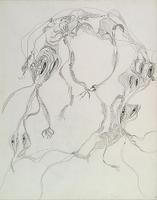Nowhere Man av Aleksandar Hemon
Pronek och Mirza startar ett band (Blind Jozef Pronek and Dead Souls) i samma veva som dom börjar tänka på sex. Låtarna låter som Yesterday, det är deras stil. Dom har elgitarrer. Allt är perfekt. Det enda dom behöver nu är en trummis och tjejer.
Några år senare, efter att Pronek hamnat i Chicago, ser han en kvinna med tjejen Sabines ögon
He would call Mirza in Sarajevo and ask him if he knew where Sabine was. She had lost both or her legs in a breadline shelling, Mirza would say. He saw her on TV, lying in the middle of the mayhem, her husband pressing his torn shirt against her blood-spurting stumps. But he heard she was in Germany now, with her husband and daughter.
Aleksandar Hemon åkte själv från Sarajevo till Chicago på ett författarstipendium innan belägringen. kunde inte åka hem blev kvar. För bokens Pronek är Chicago en tillfällighet, samtidigt som Sarajevo ligger allt längre bort. THOUSANDS KILLED IN SREBRENICA. Redan på planet över bländas Pronek av solen, drar ner rullgardinen och minns inte längre vad som hände igår. Inte heller minns han pappans böjda nacke i bilen på väg från flygplatsen.
Years later, displaced in Chicago, Pronek often wondered whether there really had been a Karen, who arrived in a Trabant from East Germany and lived in a first-floor apartment, whether her long and silky pigtails fluttered, like birds on a leash, around her head as she jumped rope; or of he really had seen a dead man, bobbing facedown in the shallow Miljacka, a chunk of flesh missing from his neck; or if he had ever seen his father's singel tear, rolling from under his sunglasses, exactly replicating the tear of the boy in Mirza's parents' living room, his father telling him the story about his high-school girlfriend who fell off her bike and died of brain hemorrhage; of if he really had ever cut off buttons from old shirts, and assembled them on the floor so as to replicate the constellations he found in the atlas of the sky.
När kom du hit frågar Rachel. 1992, just innan kriget svarar Pronek. Är din familj kvar hur är det med dom? Dom är gamla svarar Pronek. "You watch it on TV and feel nothing but numb helplessness. It just makes me angry." "I know." svarar Pronek.
(Pronek knackar dörr för Greenpeace.)
To a young couple in Evanstone who sat on their sofa holding hands, Pronek introduced himself as Mirza from Bosnia. To a college girl in La Grange with DE PAW stretching across her bosom he introduced himself as Sergei Katastrofenko from Ukraine. To a man in Oak Park with chintzy hair falling down on his shoulders, the top of his dome twinkling with sweat, he introduced himself as Jukka Smrdiprdiuskas from Estonia. To an old couple from Romania in Homewood, who could speak no English and sat with their hands gently touching their knees, he was John from Liverpool. To a tired construction worker in Forest Park who opened the door angrily and asked, "Who the fuck are you?" he was Nobody. To a Catholic priest in Blue Island, with eczema and a handsome, blue-eyed boyfriend, he was Philip from Luxembourg. To a bunch of pot-bellied Christian bikers barbecuing on a Walgreen's parking lot in Elk Grove Village, he was Joseph from Snitzland (the homeland of the snitzl). To a woman in Hyde Park who opened the door with a gorgeous grin, which then transmogrified into a suspicious smirk as she said, "I thought you were somenone else," he was Someone Else.
__________________
Aleksandar Hemon

Nowhere Man. Nan A. Talese, 2002: ISBN 0385499248
Frågan om Bruno. Bonnier, 2000. ISBN: 9100573027
-------------
Lyssna
Ali Hussein Ett telefonsamtal hem: New Meaning Radio på SR c tema familjen. Ali har spelat in ett vanligt samtal med sin bror och mor som visar hur det är när den enda kontakten med familjen går via telefonen. Lyssna här
He's a real Nowhere Man,
Sitting in his Nowhere Land,
Making all his nowhere plans
for nobody.
(Lennon)
Lyssna (wav)
Appropå ingenstans, läs också
Tidiga sorger av Danilo Kiš
Att komma hem ska vara en schlager av Per Hagman
Stranger on a Train av Jenny Diski

 @buckerna
@buckerna






 ulrika.jonsson@lena.se
ulrika.jonsson@lena.se